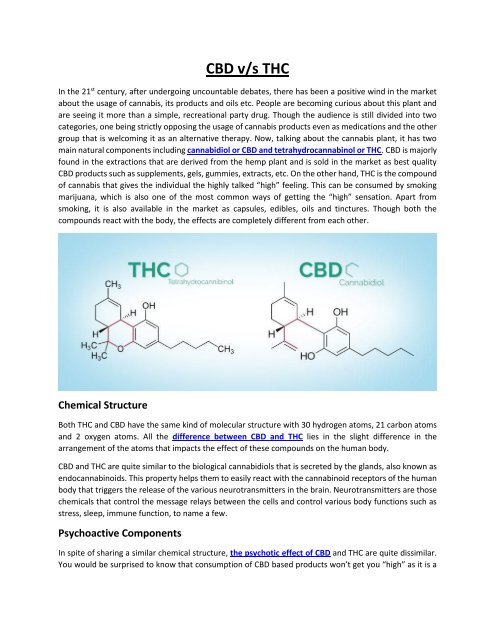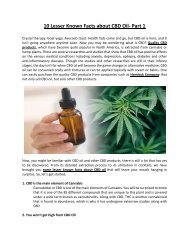CBD vs THC
You also want an ePaper? Increase the reach of your titles
YUMPU automatically turns print PDFs into web optimized ePapers that Google loves.
<strong>CBD</strong> v/s <strong>THC</strong><br />
In the 21 st century, after undergoing uncountable debates, there has been a positive wind in the market<br />
about the usage of cannabis, its products and oils etc. People are becoming curious about this plant and<br />
are seeing it more than a simple, recreational party drug. Though the audience is still divided into two<br />
categories, one being strictly opposing the usage of cannabis products even as medications and the other<br />
group that is welcoming it as an alternative therapy. Now, talking about the cannabis plant, it has two<br />
main natural components including cannabidiol or <strong>CBD</strong> and tetrahydrocannabinol or <strong>THC</strong>. <strong>CBD</strong> is majorly<br />
found in the extractions that are derived from the hemp plant and is sold in the market as best quality<br />
<strong>CBD</strong> products such as supplements, gels, gummies, extracts, etc. On the other hand, <strong>THC</strong> is the compound<br />
of cannabis that gives the individual the highly talked “high” feeling. This can be consumed by smoking<br />
marijuana, which is also one of the most common ways of getting the “high” sensation. Apart from<br />
smoking, it is also available in the market as capsules, edibles, oils and tinctures. Though both the<br />
compounds react with the body, the effects are completely different from each other.<br />
Chemical Structure<br />
Both <strong>THC</strong> and <strong>CBD</strong> have the same kind of molecular structure with 30 hydrogen atoms, 21 carbon atoms<br />
and 2 oxygen atoms. All the difference between <strong>CBD</strong> and <strong>THC</strong> lies in the slight difference in the<br />
arrangement of the atoms that impacts the effect of these compounds on the human body.<br />
<strong>CBD</strong> and <strong>THC</strong> are quite similar to the biological cannabidiols that is secreted by the glands, also known as<br />
endocannabinoids. This property helps them to easily react with the cannabinoid receptors of the human<br />
body that triggers the release of the various neurotransmitters in the brain. Neurotransmitters are those<br />
chemicals that control the message relays between the cells and control various body functions such as<br />
stress, sleep, immune function, to name a few.<br />
Psychoactive Components<br />
In spite of sharing a similar chemical structure, the psychotic effect of <strong>CBD</strong> and <strong>THC</strong> are quite dissimilar.<br />
You would be surprised to know that consumption of <strong>CBD</strong> based products won’t get you “high” as it is a
completely non psychoactive compound. Now, talking about <strong>THC</strong>. <strong>THC</strong> is known to bind with the CB1<br />
receptors of the human brain, thus creating a sense of euphoria, also known as “high” sensation.<br />
Side Effects<br />
Even after consuming exceptionally large doses of <strong>CBD</strong> or <strong>CBD</strong> based products, there are no evident side<br />
effects. According to various researchers, the reported cases of side effects due to <strong>CBD</strong> were due to the<br />
interaction of the <strong>CBD</strong> compound with any other medication that the patient was taking. On the other<br />
hand, <strong>THC</strong> is known to have some temporary side effects including dry mouth, increased heart rate, red<br />
eyes, memory loss, coordination problems and slower reaction times. Though both the compounds, <strong>CBD</strong><br />
and <strong>THC</strong> are non-fatal, extended consumption of <strong>THC</strong> can have negative psychiatric effects on the human<br />
brain. That is why, the use of <strong>THC</strong> should be discouraged among the youth.<br />
Looking for more such information on <strong>CBD</strong> and its products? Stay tuned with us for the next update.





